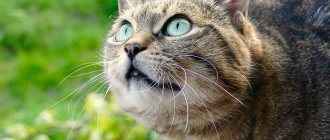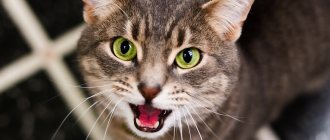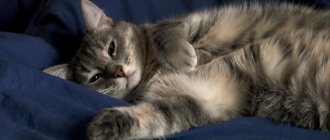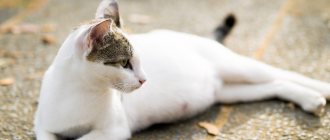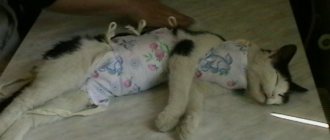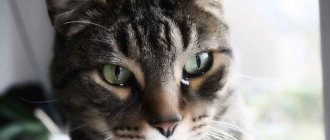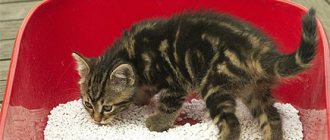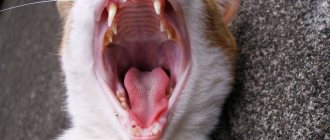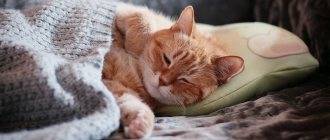What affects how long a cat sleeps?
The duration and quality of an animal's sleep depend on a number of reasons:
- Age. Young kittens and adults sleep more than middle-aged kittens.
- Breed. Representatives of the Scottish and British breeds especially like to nap. They usually go to rest immediately after eating. Abyssinians, due to their high activity, have less need for this.
- Health and stress. Sick animals sleep less than healthy ones, and their sleep is also more sensitive.
- The situation in the housing. There may be sleep disturbances if the animal experiences discomfort or if one of the family members disturbs it.
If the pet is absolutely healthy and does not experience fear or fear of anything, it will sleep at least 12 hours a day. To create more comfort for him, you should purchase a special house in which he can retire from prying eyes.
After sterilization, a cat sleeps more than before. This occurs due to hormonal fluctuations. The production of certain substances that affect activity decreases or stops altogether, which often leads to excess weight gain and increased drowsiness.
Why do domestic cats sleep more than indoor cats?
Domestic cats sleep more than stray cats because they do not need to search for food. A barn cat may not receive food for several days in a row; in this state, it will direct all its efforts to solving problems with hunger.
Backyard animals are more susceptible to stress associated with the influence of the outside world. Sleeping undisturbed for a long time can be simply dangerous to life and health.
How cat breed affects sleep duration
Belonging to the breed determines the behavior, character and duration of sleep. This is due to the characteristics of the cat’s nervous system and temperament. Easily excitable breeds, such as Asians, Siamese, and Orientals, sleep less than average.
Cats with a phlegmatic temperament - Persians, Coons, and Scots - sleep more than average. The duration of sleep determines primarily the health status of the pet. the owner must monitor the behavior of his animal and pay attention to any deviations. There may be deviations if the animal has problems with its health.
If the cat suddenly becomes lethargic, sleeps a lot, refuses to eat, does not pet or play, problems with his health should be ruled out. It is worth seeking help from a veterinarian.
When to start being anxious
Every owner knows approximately how long cats sleep in their house. And when a cat becomes overly active or vice versa, its sleep time increases, and wakefulness is reduced to the desire to lie down, then you need to take your furry friend to the veterinarian. Drowsiness or, conversely, excessive time spent awake is a signal that not everything is in order with the cat’s health.
Reasons for a sudden change in a cat’s sleep pattern:
The cat has become very active, and this activity is destructive and harmful in nature, which means the animal has problems with the thyroid gland. Disruption of hormone production shifts the norms of sleep and general behavior of cats towards irrepressible sudden activity.- The cat tries to lie down more and doze, but does not fall asleep. Take a closer look at your dog, most likely you will soon meet kittens.
- Stress, absence of the owner, highly irritating external noises during the day - all this can disrupt the cat’s sleep rhythm and cause mental and central nervous system disorders with prolonged exposure.
- Many cats are weather dependent and in bad weather or in cold winters they instinctively sleep and doze for more time. Pay attention to how your cat sleeps at this time of year, because if she is constantly huddling in a ball or looking for a warm place, then try to arrange for her to insulate her bed or move her to a warmer room. A cat with a cold is not the best pet in the house, and prevention is too simple to neglect.
- The cat wants to sleep, but constantly changes position, place and falls asleep for a short time - there may be an infection with internal parasites.
IMPORTANT: a cat that lives at home is lazier and sleeps more time. But if a cat has the opportunity to walk freely, then its activity increases, since the animal’s instincts awaken and it finds much more interesting activities than sleep. It is not for nothing that a domestic cat may never begin to show hunting interest, but even a purebred cat with the opportunity to go out into the garden will eventually begin to carry prey to the doorstep.
In general, sleep disturbance is one of the signs of a wide range of diseases, and a correct diagnosis requires an examination by a doctor and identification of additional symptoms.
How and where is the most comfortable place for a cat to sleep?
The pet chooses a secluded, quiet and peaceful place to sleep, where no one will disturb him. It is worth purchasing a house with soft walls and a bottom. Here the cat is comfortable and safe. But it has been correctly noted that cats can comfortably sleep almost anywhere. If an animal feels safe, well-fed, and healthy, it will definitely not have any problems finding a place to sleep.
Observing behavior, owners ask questions related to their cats' sleep. For example, why does a cat sleep with its eyes open? If this is noticed, you should not frighten or wake the animal. This natural state for a cat's sleep is indicative of a shallow, pleasant slumber, especially in older pets.
Sleeping with your eyes open, accompanied by symptoms of paralysis, should alert you. It is dangerous if the animal’s eyes become cloudy, convulsions are observed, and the breathing rhythm is disrupted.
A cat loves to sleep on its owner's stomach for a number of reasons. In some cases, she may feel early pregnancy. Some furry owners say that the animal sensed pregnancy before they knew about it themselves.
Sometimes the cat tries to improve the owner’s well-being in this way. It is possible that the furry one intuitively senses health problems. Some owners and even experts are confident that a cat lying on its owner’s stomach can relieve stress and improve his mood. In this case, the animal tries to position itself closer to the solar plexus.
Why does a cat sleep on its head? Many people think that this is a bad sign. In fact, in this way she is trying to express her devotion and love for the person. The cat may feel a headache and makes attempts to relieve it.
Sometimes the cat begins to exhibit strange behavior, which raises some questions for the person, such as why the cat sleeps in the litter box. This can happen for a number of reasons:
- has difficulty using the toilet, has problems with urination;
- does not have a secluded place to sleep;
- it's just a bad habit that needs to be broken.
In the first two cases, you should contact a veterinarian. In other cases, it will be enough to provide your pet with a comfortable place to sleep, taking care of its convenience and comfort.
A cat sleeps on its back for a number of reasons:
- the ambient temperature is too high and the animal is simply too hot;
- love and trust in the person and everyone living in the apartment;
- problems with organs located in the groin area;
In the latter case, it is worth observing the animal, its behavior, and whether the cat is experiencing difficulties with urination. In case of deviations, you should seek veterinary help.
Why does the kitten eat a lot?
It’s not for nothing that veterinarians strongly advise against taking babies away from their mothers too early. It is advisable that the baby is already 3 months old at that time - this is the best option. If the amount of food consumed by a kitten exceeds the permissible norm, then it is quite possible that the pet lacks some elements contained in mother’s milk.
Among the reasons why a kitten constantly asks for food can be both completely harmless and alarming:
- poor bowel function;
- individual characteristics of nutrient absorption;
- the body's needs during the period of active growth;
- various diseases, for example, diabetes, liver disease;
- use of certain medications;
- climate change (cats eat more in the cold season);
- presence of parasites.
The last reason is perhaps the most common. In this case, the kitten constantly wants to eat, meows pitifully, and screams. He eats a lot, but does not gain weight and has a big belly. With helminthiasis, another clinical picture is possible - the kitten eats little and begins to experience weight loss.
INTERESTING TO KNOW: How to switch a kitten to dry food
If your cat has parasites, he needs to be given an anthelmintic drug recommended by a specialist. Deworming is carried out twice, again - 10-14 days after the initial treatment.
Changing your sleep pattern: when to be wary
Sometimes a cat sleeps all day and starts playing at night, thereby disturbing people. Most predators are nocturnal animals, accustomed to being active in the dark. The most common domestic cat is a distant relative of tigers or panthers. They have similar habits, habits, and behavior patterns.
Material on the topic: everything about the Russian Blue cat breed.
In this case, it is worth adjusting your daily routine. This may take from a couple of days to several weeks. First of all, it is important to follow a diet. Try in every possible way to prevent your pet from sleeping during the day. Often they doze off because they are simply bored.
If a person pays little attention to them and does not play with them, the cat has no outlet for its energy and chooses to simply sleep. It is important to play with her more often, to try to realize her hunting instincts in a playful way. The pet needs to throw out its energy, which will ensure a healthy, sound sleep at night for all family members. Well, what if the fluffy dormouse just likes to take a nap for an hour or two. You shouldn't disturb her.
Cat sleep phases
Cat sleep has two phases: slow and fast sleep. NREM sleep is very similar to napping. During this phase, the cat may quickly and abruptly wake up from touch or loud noises. NREM sleep is also called low-wave sleep because the animal's breathing and heart rate are slow despite muscle tension. During this phase of sleep, the cat's metabolism decreases, and blood pressure and temperature drop.
Sleep among our furry friends is divided into two completely different types.
The second stage of sleep is REM or deep sleep. During this period, the cat's eyeballs rotate rapidly. This type of sleep occurs 10–30 minutes after the start of slow-wave sleep. During REM sleep, the pet does not control its muscles and may fall if it chooses an insufficiently comfortable place to rest. But despite the relaxation, the cat may twitch, change sleep positions, grumble and, in rare cases, even extend its claws. Interestingly, the pet’s brain activity does not decrease during deep sleep. Scientists have found that REM sleep is just as energy-consuming as being awake.
Natural factors that increase sleepiness
Just like humans, cats can also be affected by external factors that cause them to sleep longer than usual, including:
- weather - when it’s cloudy and rainy outside, not only the owner, but also his pet begins to fall asleep;
- calm environment;
- feeling of satiety;
- fatigue after games, attention from guests or household members.
Other causes of increased sleepiness. Cats and kittens can sleep for long periods of time when the air pressure is low, for example during the summer heat or before rain. Increased sleepiness of the animal may also be associated with changes in hormonal levels.
Studies have shown that female kittens sleep longer than their more active brothers.
Features of dreams. Cats fall asleep slowly; from a state of drowsiness, they enter the deep sleep phase. Scientists claim that mustachioed striped animals are capable of dreaming. And the owners notice how their sleeping pets twitch, move their paws, and squeak in their sleep. Such animal behavior should not cause alarm among owners.
Sleep and relationships with owners
Only a well-fed pet can sleep soundly. A hungry cat will not go to bed because she will want to find something edible. Kittens that have eaten a hearty meal will fall asleep peacefully, and if they feel like they haven’t eaten enough, you will hear an insistent squeak.
Lack of normal sleep in a pet is a sign of a stressful situation. For example, if a cat feels danger or fear, it will not be able to sleep properly. Because of this, he loses weight, is afraid of everything, and may even get sick. If the pet has its own comfortable corner, where it will not be disturbed, it will gradually enter the usual rhythm of life and will sleep as much as it should for the cat’s body.
Another interesting fact is how a cat chooses a place to sleep. Judging by it, as well as by its favorite “sleepy” position, you can learn about the degree of trust the animal has in its owner. If a six-month-old cat constantly sleeps on her back with her belly up, with her paws outstretched, you can rest assured that she trusts you one hundred percent. Just work on trust in your relationship with your pet, because this is how you will provide him with healthy and quality sleep.
Dangerous symptoms
A kitten that sleeps a lot, does not like to play active games, eats poorly and eats little, may be seriously ill. Pay attention to your pet and the presence of other pathological symptoms. Signs of the disease :
- dry and hot nose;
- refuses to drink;
- temperature, body tremors;
- loose stools;
- vomit;
- pallor of mucous membranes;
- dull coat;
- impaired coordination;
- giving up your favorite treats;
- lack of reaction to people, loud sounds, lights;
- dilated pupils;
- rapid breathing.
What diseases cause kittens to sleep for a long time?
Unfortunately, often the drowsiness of pets is not related to their physiological characteristics. Lethargy, decreased activity and too much sleep can be a sign of a number of dangerous diseases:
- parasite infestation; fleas, ticks, helminths;
- intoxication (food poisoning);
- intestinal obstruction;
- injuries: bruises, fractures, dislocations, sprains;
- urolithiasis;
- anemia;
- gastritis;
- leukemia;
- kidney inflammation;
- retroviral infection.
Associated symptoms. Typically, these diseases are accompanied by other alarming symptoms:
- weakness in the limbs;
- hyperthermia (increased body temperature);
- lack of appetite;
- refusal to drink;
- dry, rough nose;
- dullness and brittleness of wool;
- weight loss;
- lack of activity even during short-term wakefulness, while the awakened kitten does not play and does not respond to the owner’s calls.
All of the above changes are extremely dangerous for the kitten’s life and it is unlikely that he will be able to solve the problem with sleep. The situation requires the mandatory intervention of a veterinarian, competent diagnosis and treatment. Experts recommend not to hesitate and immediately seek professional help.
